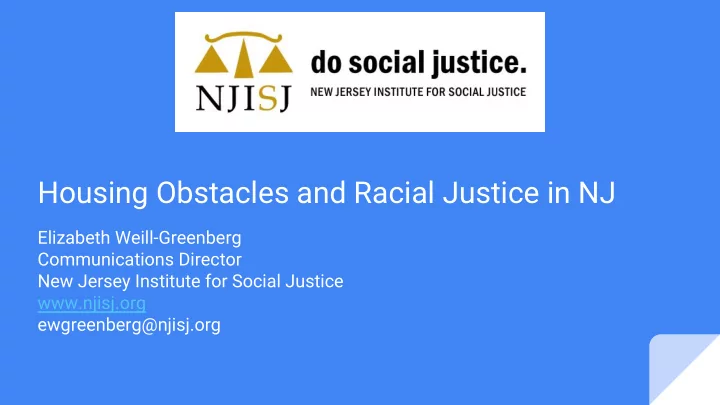

Housing Obstacles and Racial Justice in NJ Elizabeth Weill-Greenberg Communications Director New Jersey Institute for Social Justice www.njisj.org ewgreenberg@njisj.org
"I was at work and the guy called me and told me to come pick up my keys. So I was happy. I got a place to stay," Lofton says. "So then ... 45 to 50 minutes later he calls and says, 'Is there something you're not telling me?' and I say, 'No, what is there?' And he says, 'You didn't tell me you had a background.'" Denying Housing Over Criminal Record May Be Discrimination, Feds Say
"It would be absolutely disruptive and possibly push me out of a town where I finally feel like I’ve found my way," said Josh Gravens, who lives near a park. "Dallas is the first city I felt I had a chance. A lot of places I was terrified of my own name." Tide turns against US residency restrictions for sex offenders
USA: Leader in Incarceration
Housing policies for people with criminal convictions is a racial justice issue: “Because of widespread racial and ethnic disparities in the U.S. criminal justice system, criminal history-based restrictions on access to housing are likely disproportionately to burden African-Americans and Hispanics.” New HUD guidance on criminal records and the Fair Housing Act
New Jersey’s Prison Population New Jersey reached its peak prison population in 1999, with 31,493 prisoners, and reduced its size by 26% by 2012. New York and New Jersey led the nation by reducing their prison populations by 26% between 1999 and 2012, while the nationwide state prison population increased by 10%. The Sentencing Project
By the Numbers 2017: According to the Department of Corrections, there are 19,619 people incarcerated in New Jersey in either correctional institutions or satellie units. Almost 14,000 are housed in an adult prison. TOTAL INMATES IN NEW JERSEY STATE CORRECTIONAL INSTITUTIONS AND SATELLITE UNITS
Coming Home and Needing a Home ● Approximately 10,448 people were released from NJDOC institutions during the 2015 calendar year. ● The median term for NJDOC incarcerated persons is six years. ● As of January 2016, 44 percent of all NJDOC incarcerated persons are serving terms of one-to-five years; 17 percent are serving terms of six-to-nine years; and 38 percent are serving maximum sentences of 10 years or more. Department of Corrections Frequently Asked Questions
NJ: A leader in racial disparities Black Americans are incarcerated in state prisons at a rate that is 5.1 times the imprisonment of whites. In eleven states, at least 1 in 20 adult Black males is in prison. Latinos are imprisoned at a rate that is 1.4 times the rate of whites. Hispanic/white ethnic disparities are particularly high in states such as Massachusetts (4.3:1), Connecticut (3.9:1), Pennsylvania (3.3:1), and New York (3.1:1). The Sentencing Project
Black ● 11,988 -- 61% (13.7% of the general population) White ● 4,304 -- 22% (68.6% of the general population) Hispanic ● 3,155 -- 16% (17.7% of the general population) OFFENDERS IN NEW JERSEY CORRECTIONAL INSTITUTIONS ON JANUARY 3, 2017, BY RACE/ETHNIC IDENTIFICATION; 2010 Census
Asian 120 -- 1% (8.3% of the general population) ● American Indian ● 10 -- 0% (0.3% of the general population) Other or Not Coded 42 -- 0% ● OFFENDERS IN NEW JERSEY CORRECTIONAL INSTITUTIONS ON JANUARY 3, 2017, BY RACE/ETHNIC IDENTIFICATION; 2010 Census
NJ in the National Context New Jersey is one of five states (along with Iowa, Minnesota, Vermont, and Wisconsin), where the racial disparity is more than 10 to 1 . New Jersey is one of twelve states, in which more than half of the prison population is Black. New Jersey has the highest Black/white racial disparity in the country: Blacks are twelve times more likely to be imprisoned than whites. The Sentencing Project
Housing Secretary Julian Castro: "When landlords refuse to rent to anyone who has an arrest record, they effectively bar the door to millions of folks of color for no good reason." Denying Housing Over Criminal Record May Be Discrimination, Feds Say
Recommend
More recommend